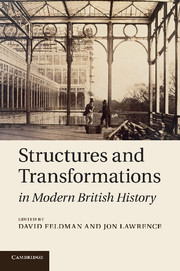Book contents
- Frontmatter
- Contents
- List of figures
- Notes on contributors
- Introduction: structures and transformations in British historiography
- 1 Coping with rapid population growth: how England fared in the century preceding the Great Exhibition of 1851
- 2 The ‘urban renaissance’ and the mob: rethinking civic improvement over the long eighteenth century
- 3 Forms of ‘government growth’, 1780–1830
- 4 Family formations: Anglo India and the familial proto-state
- 5 The commons, enclosure and radical histories
- 6 Engels and the city: the philosophy and practice of urban hypocrisy
- 7 The decline of institutional reform in nineteenth-century Britain
- 8 British women and cultures of internationalism, c.1815–1914
- 9 Psychoanalysis, history and national culture
- 10 Labour and the politics of class, 1900–1940
- 11 The dialectics of liberation: the old left, the new left and the counter-culture
- 12 Why the English like turbans: multicultural politics in British history
- Index
4 - Family formations: Anglo India and the familial proto-state
Published online by Cambridge University Press: 04 February 2011
- Frontmatter
- Contents
- List of figures
- Notes on contributors
- Introduction: structures and transformations in British historiography
- 1 Coping with rapid population growth: how England fared in the century preceding the Great Exhibition of 1851
- 2 The ‘urban renaissance’ and the mob: rethinking civic improvement over the long eighteenth century
- 3 Forms of ‘government growth’, 1780–1830
- 4 Family formations: Anglo India and the familial proto-state
- 5 The commons, enclosure and radical histories
- 6 Engels and the city: the philosophy and practice of urban hypocrisy
- 7 The decline of institutional reform in nineteenth-century Britain
- 8 British women and cultures of internationalism, c.1815–1914
- 9 Psychoanalysis, history and national culture
- 10 Labour and the politics of class, 1900–1940
- 11 The dialectics of liberation: the old left, the new left and the counter-culture
- 12 Why the English like turbans: multicultural politics in British history
- Index
Summary
For Marxist, functionalist and feminist historians alike, the family figures as a cornerstone of capitalist modernity. From Friedrich Engels's Origins of the Family, Private Property and the State, through Talcott Parsons's theorisation of the nuclear family's role in sustaining industrialisation to Hall and Davidoff's analysis of the gendered construction of Victorian class identities, the close nexus between family formations and economic development has remained a constant of the historical analysis of eighteenth- and nineteenth-century British society. To be sure, scholars have disagreed fundamentally as to the nature of this pivotal relationship. For Alan Macfarlane, it was precisely because its marriage system was highly individualised and dis-embedded from kin networks that capitalism flourished in England; for Richard Grassby, in sharp contrast, capitalist development required the property of London's business classes to be ‘vested and consolidated in the family, not the individual’.
Although older traditions of imperial history remained largely insulated from these historiographical debates, the emergence of ‘new’ imperial histories has fostered an efflorescence of scholarship on the part played by family relationships in shaping the conflicted modernities of the British empire. In this context, arguments about the pivotal role of the family as an instrument of ‘bourgeois’ capital formation have gained new purchase, becoming imbricated with Foucauldian histories of race, biopower and colonial governmentality. Enriching our understanding of the social origins of economic and political change, the new imperial history of the British family has focused overwhelmingly on problems of racial alterity and exclusion.
Keywords
- Type
- Chapter
- Information
- Structures and Transformations in Modern British History , pp. 100 - 117Publisher: Cambridge University PressPrint publication year: 2011
- 4
- Cited by

